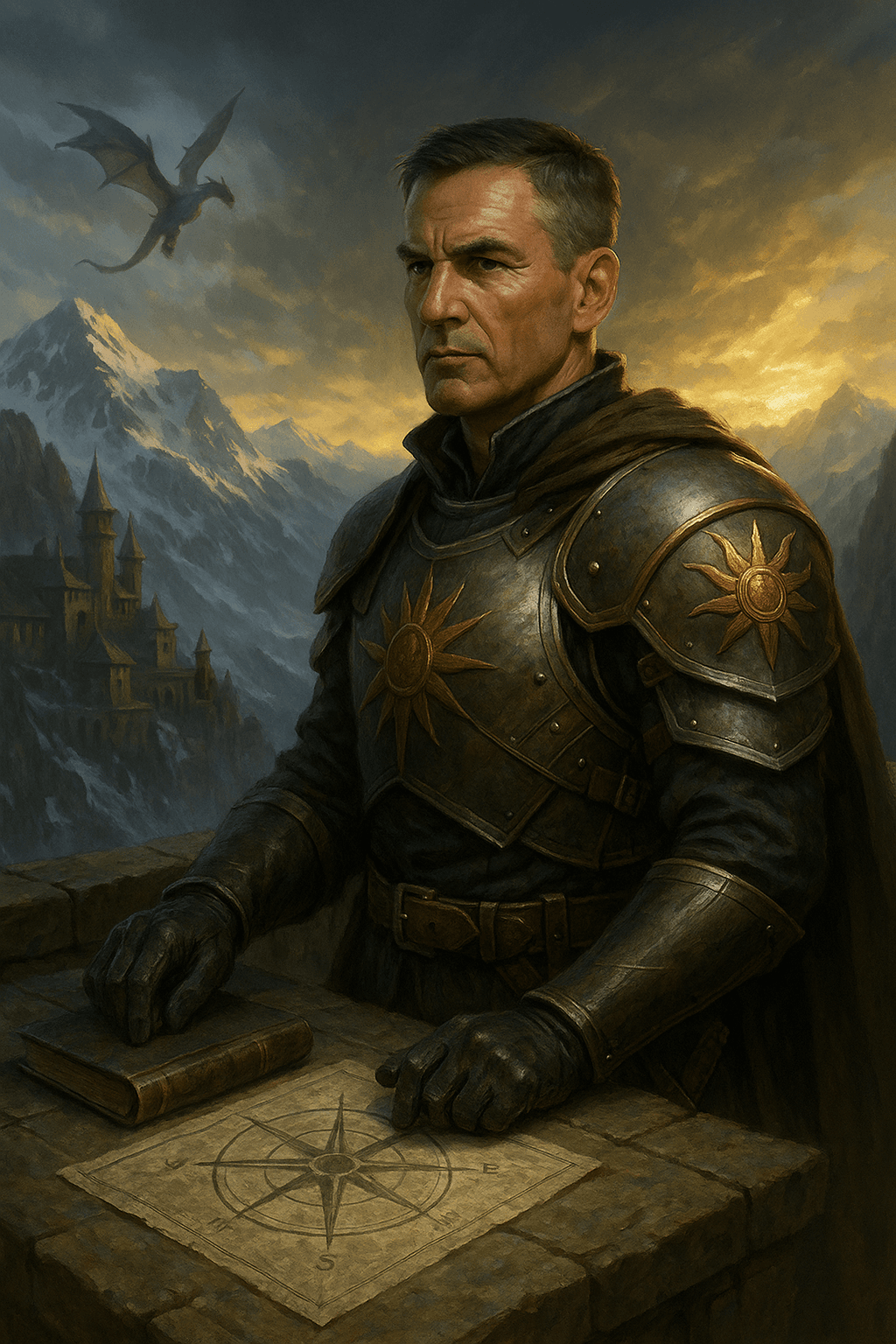Ser Kaelen Duskveil
Hold the line—then teach it.

There is a way Ser Kaelen Duskveil sets a training ring that tells you everything about him: chalked wind-roses for approach vectors, buckets of sand for blown landings, a brazier banked low because warmth dulls attention. He speaks little, watches everything, and expects the same of those who would wear the Wardens’ sun. Where other captains posture, Kaelen measures; where others perform, he prepares. In every age that named him, the work was the same—turning courage into craft.
Ascendance.
In the height of Itharûn’s pride, when citadels shone and the sky was thick with patrols, Kaelen earned his spurs not by spectacle but by consistency. A veteran rider-instructor under High Flamekeeper Aeraleth (Early), he codified the drills Stormriders still use—spiral dives that bleed speed without bleeding riders, wingpair signals that cut through thunder, and the iron rule that rescue outranks glory. He could be stern to a fault; cadets whispered that he trimmed excuses with the same neatness he trimmed flight lines. But they also knew he walked the ramparts long after drills ended, hands on cold stone, plotting safer routes through the storm corridors that took more lives than any enemy. “We will meet chaos with procedure,” he told new flights. “When fear pulls you apart, the pattern holds you together.”
Fracture.
The Shattering tested that creed until it screamed. Leylines buckled; wind went strange; dragons once steady turned feral or fled. Kaelen’s title did not change, but the job did. Stern, honorable, rigid—yes, because the world around him was coming unfixed. He rode escort for evacuation trains, held failing keeps until civilians cleared the tunnels, and then led counter-flights against deserters whose panic endangered everyone else. He mentored a fire-brave prodigy named Ysara Flamewing, sanding recklessness down to purpose without dimming it. “You will hate me for making you patient,” he told her. “Later, you will live because of it.” During the worst season, when bonded pairs broke midair and fell like meteors, Kaelen’s patrols harvested what they could from the ash—gear, journals, names—so widows and stablehands had something to hold. If he wept, it was where no one saw. If he faltered, the line did not know it.
Twilight.
After the Last Sky War’s smoke thinned, Kaelen stood amid victory that tasted like metal. Itharûn endured, but burnt thinner; too many riders were names on the memorial stone. Promoted to the council and charged with rebuilding the officer corps, he became the champion of reforms that sounded unglamorous and proved essential—shorter tours for front-line riders, bonded-pair counseling, standardized retrieval protocols so no fallen went unsearched. Disillusioned? Perhaps. He had seen the cost of banners that outran their budgets, of speeches that outpaced rations. His mentorship of Ysara had become a distance edged with pain; the war had taken different pieces from both of them, and their shared language had roughened. Still he held the ring at dawn, set the chalk, lit the brazier low. Still he taught.
Echoes.
When Aurelion Flameheart rose to lead the Wardens with a vision of renewed unity, Kaelen stepped into the role of Council Elder—pragmatic to Aurelion’s charismatic, the ballast to a friend’s bright sail. He supported the Oath of Reclamation but insisted each pledge be paired with a ledger: resources, routes, fallback lines. He kept a guarded eye on the young Nyra Flamebond and her Embermane, not to smother hope but to keep it from outrunning the ground beneath it. “We cannot afford the old illusions,” he reminded the council. “Let our courage be audited.” Some called him cautious; he accepted the word like another piece of kit to carry. The storms had not stopped, only changed timbre. Kaelen listened to them as he always had—one hand on the rail, eyes on the line where sky meets mountain.
What does he want now? Not statues. Not songs. He wants a generation that doesn’t have to learn the hard parts the hard way. He wants formations that flex without breaking, treaties that hold when the first loss hits, and leaders who understand the difference between risk and gamble. In a world where dragons are returning and old pacts wake with them, Kaelen is the officer who will say “yes” to wonder and “no” to haste in the same breath—and mean both as an act of care.
The cadets still whisper about the severity of Ser Kaelen Duskveil. They forget how often he stands watch while they sleep, rewriting tomorrow’s schedule to match tonight’s weather, checking the brazier so the room is cold enough to sharpen them but not so cold it breaks them. Discipline, in his hands, is a kindness with edges. And the line he holds is one he intends to pass on—not as burden, but as a shape the brave can live inside.
